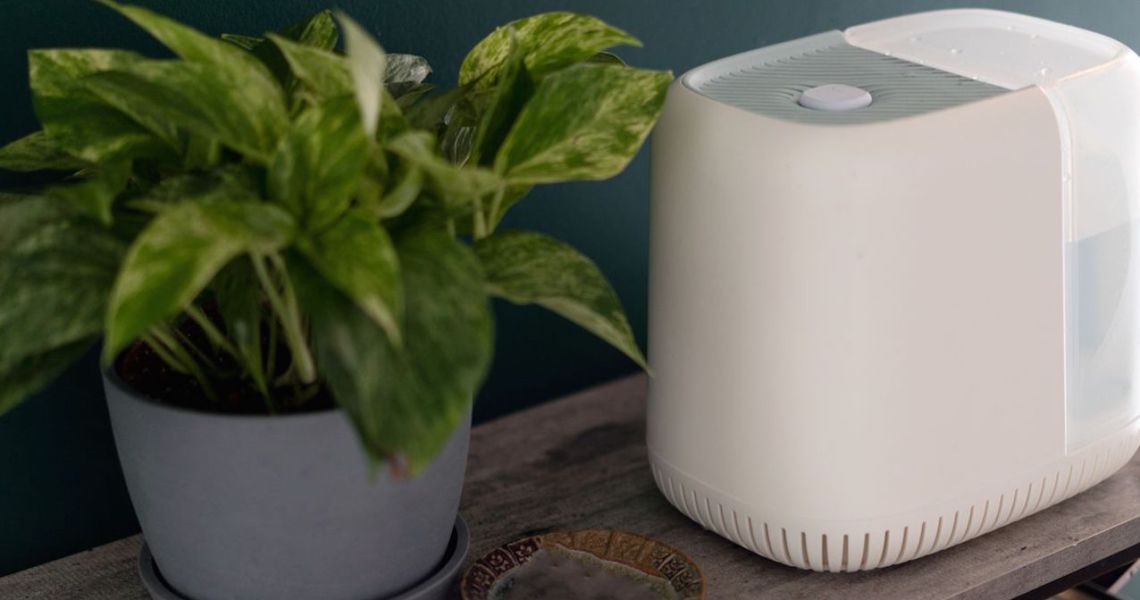Would you consider a hair dryer a beauty device? What about a humidifier or air filter? Maybe not, but the beauty industry is revamping the home by re-engineering practical and overlooked household devices with a beauty overlay.
On June 14, 16-year-old beauty brand Skin Authority debuted a consumer-facing air filtration device called Air Beautification Filtration & DefenderPro, sold for $899 via its DTC website. It was previously available to professionals only within salons and spas. Skin Authority’s Air Beautification follows the launch of a beauty-focused air humidifier from Canopy in Oct. 2020 for $150 (or $125 with a water filter subscription) and from Hey Dewy in Jan. 2019 for $39. Canopy and Hey Dewy are sold DTC and at retailers like Violet Grey, Urban Outfitters and Revolve. Meanwhile, beauty fridges — which are actually traditional mini-fridges — have been marketed as a beauty must-have since at least 2018, with brands like Kylie Skin, Drunk Elephant and even Evian water getting on board. L’Oréal is also getting in on the household device space; it plans to offer a beauty-focused showerhead in mid-2022.
“Beauty consumers are doing many things to build a routine, but there was a whole element of the [at-home] routine that was not focused on,” said Eric Neher, Canopy CMO. “In the case of the Canopy humidifier, we promote the increased indoor humidity as a big part of an effective skin-care routine.”
Canopy was incubated out of consumer products development agency Doris Dev, which previously brought to market eco-friendly cleaning brand Blueland and refillable deodorant brand By Humankind.
The beautification of the home is a result of several trends converging. The concept of inner-outer beauty through a mix of topical products and ingestible supplements established the idea that beauty was more than skin deep. And in 2020, people increasingly turned to home improvements, décor, candles and aromatherapy as a means of establishing a domestic sanctuary. It is a narrative that the beauty industry was glad to latch onto. Home beautification takes these two trends further by setting up a room or home with appliances specifically to assist in beauty routines. Call it a “smart home” for beauty, if you will.
Earlier iterations of home beautification brands include Nest, with its automatic and app-connected home fragrance diffuser in partnership with Pura. In 2019, Dyson positioned itself as a “Well-being” company, with its mix of traditional beauty appliances like its hair dryer and better-for-you lighting said to not disrupt circadian rhythms. Previously, Dyson helped reenergize the hair-dryer category with its design-first approach, as the traditional category suffered from a utilitarian point-of-view. In an industry in which brands try to offer themselves as a lifestyle, beauty smart-home devices present a more complete and tangible mode of living than a candle or body wash does.
Both Celeste Hilling, Skin Authority founder, and Neher agree that Covid-19 had a significant impact on the home beautification trend. More people spent time indoors and turned to beauty as a self-care routine. They also became more concerned about negative impacts on their health, such as air pollution. According to the Environmental Protection Agency, Americans, on average, spend approximately 90% of their time indoors, where the concentrations of some pollutants are often 2X -5X higher than typical outdoor concentrations.
Ad position: web_incontent_pos1
Much of Skin Authority’s marketing has tried to relay through both professional salons and spas and its social media that its FDA-approved device filters out pollution in the air better than most existing filters. Its .1 microns filtration system — the supposed size of everyday particles from smoke, candles, general pollution and indoor technologies — captures more than most traditional HEPA filters which only catch .3 microns of particles. Skin Authority also plans to host in-person influencer and media events in New York City and Los Angeles during the third quarter of 2021.
“Moving forward for beauty and skin health, the narrative will be a combination of eating well, topically protecting yourself from the environment, and then thinking about the environment you’re in and the air that surrounds you,” said Hilling.
Thus far, most of Canopy’s marketing has focused on customer education about how humidity helps hydrate the skin, why Canopy is superior to other available products and why people should use humidifiers year-round. Currently, Canopy has a cross-promotion partnership with DTC mail-order plant company The Sill to reach like-minded customers. Neher said that Canopy will launch additional products related to humidifiers and other indoor products by the end of 2021.
“The home is an area where people do have more control over their [beauty] and environment,” said Neher. “To a certain extent, we can protect ourselves from things like pollution, but not entirely. [Control] is a major part of the thesis behind the Canopy brand.”




